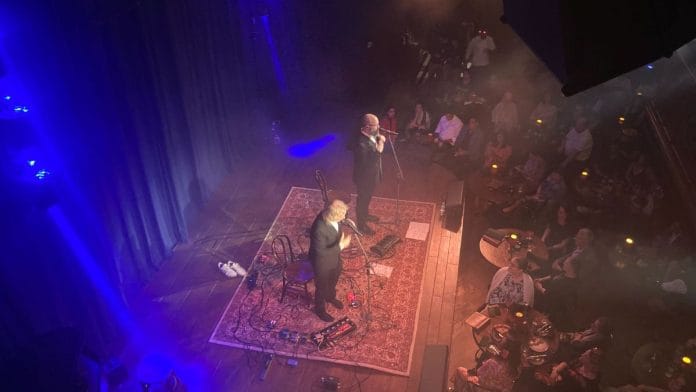New Delhi: From Eurovision to Delhi’s Piano Man Jazz Club, the Estonian nu-folk band Puuluup enthralled ambassadors, diplomats and guests alike with their songs, humour and dance moves on Monday evening. The themes they explored? Agriculture and other mundane things.
For the benefit of those gathered, the duo explained each of the songs they performed—which were a mixture of Estonian, Finnish and sometimes English—often with a single word to highlight the theme. For most of the night, the songs were about agriculture or “krishi” as one of the performers said in the most deadpan of tones. Other songs were on simpler things like a television, and one was even on Estonia’s only windmill.
“A break is much needed in our hectic day,” declared Marje Luup, the Estonian ambassador to India at the start of the event, with a promise that the duo would provide the gathered audience with the needed pause.
By the end of the event, the ambassador’s promise was not only met, but everyone present also got a glimpse of Estonian culture. And with it a window into the sense of the humour, nature and music of the Baltic country home to less than a million people.
“Eurovision was a step in a completely different direction or musical genre and we were worried about what would happen with our fans. But it was the right decision. It gave us so much, a great experience and the possibility to test yourself in this very hardcore show business,” Marko Veisson, a member of the duo, told ThePrint.
He added that the competition, which was held in Sweden earlier this year, gave the band a platform to bring their music across the world. The guests at Piano Man in New Delhi were given a front-row seat to their style—the use of Talharpa, a four-stringed bowed lyre found in Northern Europe, along with a looping machine to produce sounds, which varied from electronic beats to electric guitars.
“At the same time, we still continue with our normal or abnormal musical style and continue performing in different clubs, but I do not think that [Eurovision] ultimately defines us,” asserted Veisson.
Also read: Ukrainian pianist mixes music, Putin and history at Delhi jazz club. His mission political
Inspired by the trees, hills, swamps
Puuluup, is a portmanteau of puu which means “tree” or “wood” in Estonian and luup, which stands for the looping techniques the duo uses in their music. The band was able to have nearly everyone present at the venue rise to dance along with their songs by the time the night ended.
Of the roughly 50 people present at the venue, a large number were ambassadors, especially from European countries.
The band, which consists of the duo—Ramo Teder and Veisson—brought with them an arsenal of songs based on Estonia’s nature, which in Veisson’s words is mostly “trees, hills and swamps, and maybe some fields”.
Their art, Veisson said, has “many elements of folk music,” but it is more than just that, with a “mixture of different styles” grounded with the use of the traditional Talharpa—a Viking-era instrument.
The deadpan Veisson and Teder’s quirky dances on stage led the crowd in a line dance across the room, leaving them laughing throughout almost two hours of performance.
This performance is their second tour of the country. It came about due to an invitation to the folk festival at Jodhpur, which then developed into performances in Bengaluru and with the support of the Estonian embassy, a stop in New Delhi.
“Everywhere in India, the hospitality has been amazing. We love Indian food and the distances are huge, cultures are different, but the same warm welcoming hospitality everywhere…We just came from Rajasthan where we heard a lot of very very different, beautiful and interesting Rajasthani music. It is very inspiring,” said Veisson.
(Edited by Theres Sudeep)






